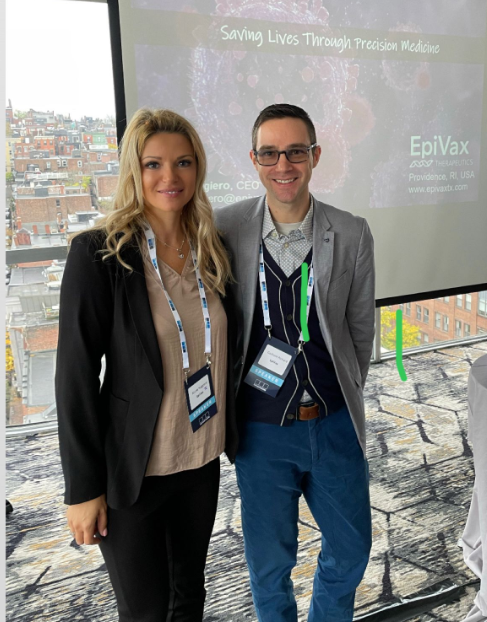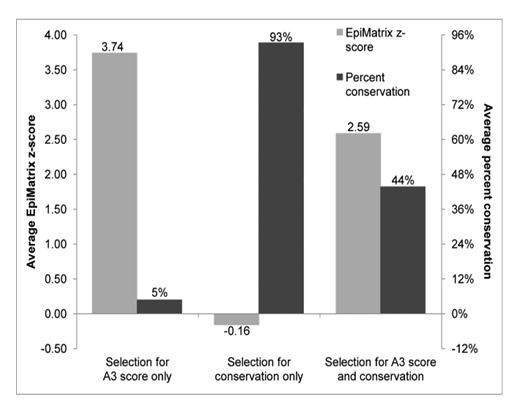GreenLight and EpiVax Tx are Personalizing Cancer vaccines!
We are thrilled to highlight the new collaboration between EpiVax Therapeutics and the mRNA company, Greenlight Bioscience. Read EVT’s Press Release to find out more about their inspiring work on personalized cancer vaccines. We believe that every cancer patient deserves their own personal vaccine and EpiVax Tx is working hard to make that vision a reality!

CEO Nicole Ruggiero and CTO Guilhem Richard are shown after their presentation at a recent Neoantigen conference. Also, if you’re interested in learning more about the latest innovations in the development of personalized immunotherapies, be sure to check out Guilhem Richard‘s recent paper on using human intelligence-informed algorithms to develop cancer vaccines here. 😊
Chatbot writes code, invents personalized vaccines…
Speaking of which (cancer vaccine design), have you noticed that AI-driven bots are running our lives lately? They help order food, satisfy customer complaints, and generate search results. Meet ChatGPT. It runs on “advanced” neural networks … and uses the internet as its source. Therein lies the problem.
I’ve been arguing with ChatGPT (yes, with the bot itself) over the last few weeks. Always polite, that GPT Chatbot! I’ve asked: Are your results accurate?. It says: “... if the input data used to train a neural network contains inaccuracies, the network will incorporate those inaccuracies into its predictions, leading to inaccurate results,” and … (wait for it) “quality of the input data is a crucial factor.” The problem with neural networks, in geek terms, is “garbage in, garbage out”. We’re well aware of that at EpiVax (early on, we recognized flaws in T cell epitope data published on IEDB). Our algorithms leverage Human Intelligence in our customized vaccine and biologics design toolkits to improve their accuracy.
But they say, ChatGPT generates new ideas! It comes up scientific hypotheses! and with new inventions! Wonder of wonders! I asked it to combine “T-cell epitope prediction tools” with “human genome data” and it suggested: “… a “Personalized Vaccine Design System” that … would use advanced computational algorithms to analyze a person’s genomic data and predict the T cell epitopes that are most likely to elicit a strong immune response in that individual.” Hmmm, where have I heard of that before… here, maybe?
Is ChatGPT really so powerful? I believe that we need human intelligence to inform decisions but I’m happy to leverage AI to help find the way. Tell me what you think! But now that AI bots are busy recycling terabytes of internet information for millions of users, AI won’t go back in Pandora’s box.
“Mosaic” HIV Vaccine is Ineffective (again)…
Speaking of computational vaccinology, yet another Phase III clinical trial of the “mosaic” HIV vaccine championed by LANL and Harvard was discontinued after a review board determined it was not effective. This “mosaic” vaccine combined conserved immunogenic sequences from viral variants, theoretically driving broadly protective immunity. As we pointed out in 2012, due to the nature of HIV evolution, the vaccine contains highly conserved, non-immunogenic regions.

The figure above compares the efficacy of different approaches to HIV epitope selection in vaccine design, by analyzing hundreds of thousands of HIV sequences, showing that selecting peptides that are both immunogenic (EpiMatrix score >1.64) and conserved, a.k.a immunogenic consensus sequences, is the way to go! (see this link and this one, for an explanation of our approach to HIV vaccine design).
We postulate that the focus on conserved regions, regardless of T Cell epitope content, may have resulted in the design of an HIV vaccine with few or ineffective T cell epitopes. Point being, computational vaccinology can benefit from Human Intelligence, and T Cell Epitope content matters!
